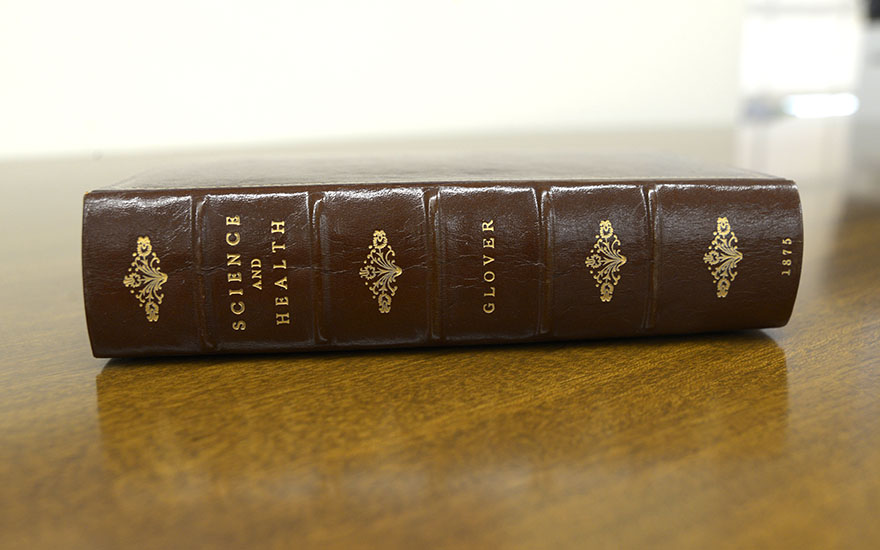How did Eddy refer to “hygiene”?

First Edition of Science and Health by Mary Glover
We are sometimes asked about Mary Baker Eddy’s uses of the word hygiene. What did she mean by it? Is our modern-day understanding in alignment with her usage?
We found this interesting statement on “perfect hygiene,” attributed to Unitarian clergyman William Ellery Channing (1780–1842), published in the October 1884 issue of The Christian Science Journal:
The universal prevalence of desire in the human race is a sufficient proof that we have not yet discovered knowledge of the laws of God with respect to the body. To lose consciousness of these was perhaps the beginning of sin. Its first effect was to spoil the pure mind of its original holy instincts, and dim its powers of sense perception. The last triumph of Christianity may be the discovery of a perfect hygiene.—Dr. Channing.1
Here is Webster’s definition of hygiene from the 1880s:
That department of medical science which treats of the preservation of health; a system of or rules designed for the promotion of health.2
Today “hygiene” is most frequently used in referring to bodily cleanliness. But the core concept of laws of health (as Channing implied) is also still found. Looking at Eddy’s uses of this and related terms, we find she references both meanings. For example, she made this statement in her book Science and Health with Key to the Scriptures:
If half the attention given to hygiene were given to the study of Christian Science and to the spiritualization of thought, this alone would usher in the millennium. Constant bathing and rubbing to alter the secretions or to remove unhealthy exhalations from the cuticle receive a useful rebuke from Jesus’ precept, “Take no thought . . . for the body.” We must beware of making clean merely the outside of the platter.3
In 1888, Eddy asked her student Emma Lane, “Can you find in any work higher ethics than in Science and Health? Can you find in any work as good a system of Hygiene?”4 One passage in Science and Health that focuses on hygiene as a system involves the narrative of a “person who when quite a child adopted the Graham system to cure dyspepsia.” In fact, the passage refers to Eddy’s own experience:
Food had less power to help or to hurt him after he had availed himself of the fact that Mind governs man, and he also had less faith in the so-called pleasures and pains of matter…. For many years he had been kept alive, as was believed, only by the strictest adherence to hygiene and drugs, and yet he continued ill all the while. Now he dropped drugs and material hygiene, and was well.
He learned that a dyspeptic was very far from being the image and likeness of God, — far from having “dominion over the fish of the sea, and over the fowl of the air, and over the cattle,” if eating a bit of animal flesh could overpower him. He finally concluded that God never made a dyspeptic, while fear, hygiene, physiology, and physics had made him one, contrary to His commands.5.
In a 1905 Boston Herald interview with journalist Sybil Wilbur (who would later write one of the first biographies of Eddy), Eddy succinctly answered Wilbur’s questions about hygiene—and hinted at a spiritual perception of it:
Does it (Christian Science) discourage the study of anatomy, physiology, and hygiene? Not of spiritual hygiene.
Is it proper for the Christian Scientist to disregard the laws of hygiene, or merely to disregard them if circumstances make it necessary? To disregard all that denies the Allness of God, Spirit, and His laws.6
One year earlier, Eddy made this statement. Referring to her discovery of Christian Science in 1866, it appeared in an article she wrote for Bohemia, a volume published by the International League of Press Clubs:
My discovery that mankind is absolutely healed of so-called disease and injuries by other than drugs, surgery, hygiene, electricity, magnetism, or will-power, induced a deep research, which proved conclusively that all effect must be the offspring of a universal cause.… Then I was healed, and the greatest of all questions was solved sufficiently to give a reason for the hope that was within me.7
You might also be interested in these articles on the Library website: Vaccination: what did Eddy say? and What did Eddy say about reporting and treating contagious diseases?
- Untitled statement, The Christian Science Journal, October 1884, 1. An earlier publication of this may be found in “Rev. William Ellery Channing,” in The New England Medical Gazette, October 1880, 319.
- Noah Webster, Chauncey A. Goodrich, and Noah Porter, An American Dictionary of the English Language (Springfield, MA: G. & C. Merriam & Co, 1886). At the time of Eddy’s passing in 1910, an 1887 copy of An American Dictionary of the English Language was in her library at Chestnut Hill, Massachusetts. See “What Dictionaries Did Mary Baker Eddy Own?” accessed 16 April 16 2021, https://www.marybakereddylibrary.org/research/dictionaries-mary-baker-eddy/
- Mary Baker Eddy, Science and Health with Key to the Scriptures (Boston: The Christian Science Board of Directors), 382.
- Eddy to Emma L. Lane, 4 March 1888, L04171.
- Eddy, Science and Health, 222.
- Sybil Wilbur, “An Interview with Rev. Mary Baker G. Eddy,” Christian Science Sentinel, 17 June 1905, 671.
- This article was later reprinted as “Fundamental Christian Science,” in Eddy, The First Church of Christ, Scientist, and Miscellany (Boston: The Christian Science Board of Directors), 347–350. This passage is found on page 348.

